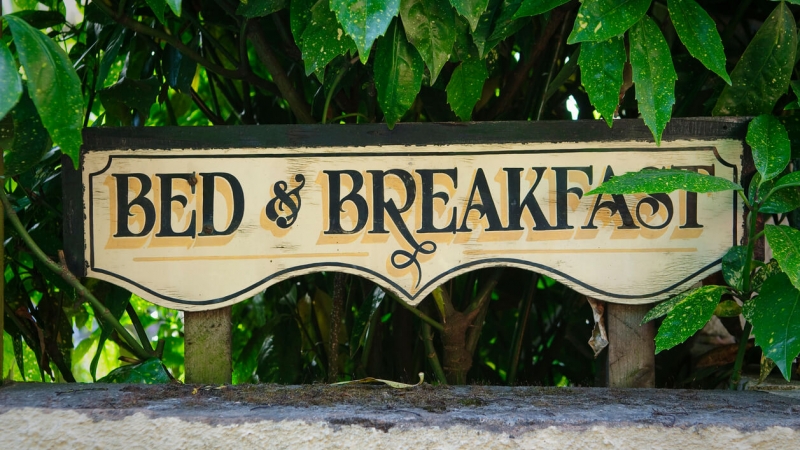If you’re running a bed and breakfast, inn, or other small property, you know it's difficult to get noticed by potential guests. Airbnb properties, larger hotels, and other B&Bs offer so many options for guests that it can be tough to make your B&B stand out — especially during the age of digital transformation. You also may lack the time, resources, and team members to pull off an ambitious marketing strategy like bigger hotels. Luckily, there are some great bed and breakfast marketing strategies to boost your business without breaking the bank.
To move forward, you’ll need a little bit of creativity and a good understanding of the types of guests who stay at your hotel, which we're willing to bet you already have. All of these stategies have the potential to pay off in increased buzz about your property and more bookings.
Explore 8 tips for successful bed and breakfast marketing:
1. Find your niche.
All good bed and breakfast marketing starts with one core question: Who are you serving? B&Bs have an advantage over larger hotels when answering this question. You are likely on the front lines at your property interacting with guests all the time, and finding commonalities among your guests should be relatively easy. How would you describe your guests? What brings them to your B&B? What type of experience are they looking for when they stay? Do certain local events, attractions, or activities draw them in?
Once you know who your guests are, you’ll need to define your niche. You need to know why guests would choose your property over all the options out there. How do you stand out from the local Airbnbs, bigger hotels, and other small properties? Establish three things that set you apart from the competition, and at least two niche audiences that you serve. These will serve as the core of your marketing strategy. The things that set you apart will determine your messaging and could be the subjects for specific landing pages on your website. The niche audiences you serve will determine where and how you advertise, as well as the types of specials, discounts, and additional amenities you offer.
2. Work with your chamber of commerce and local travel sites.
The research process for a B&B stay often looks a little different than for a larger hotel or Airbnb. Potential guests are often looking for stays that are more connected to the community, offer access to certain activities, or have a certain atmosphere. Because of this, customers may turn to local travel websites, chamber of commerce listings, or local blogs for advice about the B&Bs that meet their needs. By crafting relationships with these sites, you can make sure your B&B is on all of the relevant lists, blog roundups, and maps that these organizations offer.
To make it super easy for websites and local organizations to spread the word about your B&B, put together a mini promotional kit to send out. This kit should include a short description of your property, relevant information about size, number of rooms, and layout, and contact details for your website and for phone booking. Make sure to include 3-5 high-quality images that show off your property and its value to guests. You can also include a short bulleted list of key property or area features that you’re known for, such as your stellar breakfast, historic building, miles of walking trails, recent updates to rooms, or downtown location.
3. Partner with local businesses.
Local travel sites and your chamber of commerce are not the only ones who can spread the word about your B&B. Partner with local businesses that complement yours, so that you can help each other and create a co-marketing relationship. Can you feature toiletries from a local business in your bathrooms, or baked goods from a local bakery in your breakfasts? What about discount coupons for local restaurants, events, or attractions?
Boost your bed and breakfast marketing today!
While physical products and discounts are a great start, you can take these relationships even further as you continue to work with businesses in your community. Many B&Bs have formed beneficial relationships with local stores, services, and restaurants that lead to co-sponsored events, co-marketing campaigns, and official referral programs. The relationship can become whatever you want to make it. Start small to test the waters, and add to the arrangement over time as both you and the business get comfortable.
4. Brush up on your local SEO skills.
We can't overstate how important this step is. In fact, search engine optimization, or SEO, is more important than ever for your bed and breakfast. A well-optimized website is easy for search engines to crawl and read, and therefore easy for a potential guest to find on search engines. Put simply: Your potential is significantly capped without the right SEO.
For B&Bs, local SEO is paramount. This is the idea of using location-based keywords and keyword phrases to capture traffic from those looking for a stay near you. A great way to start with this is a simple search exercise. Imagine that you're a potential guest looking for a property like yours. Then head to Google. What will you search for? When you search for that phrase, what comes up? Do you see your competitors? Are there lots of Airbnb listings or larger hotels? Try this a few times with different combinations of words and phrases related to your location, amenities, property features, local events, or other factors that tend to interest your guests. Make notes as you go so that you know what comes up and how you would like to market your property.
Next, head to a tool like Google Keyword Planner and type in the phrases you used. The keyword planner tool then gives you historical search data for those phrases, as well as suggestions for other words and phrases that searchers might use. What you’re looking for are search terms with relatively high volume, but only low or medium competition. This means that you can create landing pages, website copy, and other content targeting these keywords and have a chance of appearing high in the rankings on search engines for those phrases.
If you’re just starting out with SEO, write down 5-10 of the phrases you would like to target, and consider how to incorporate them into your marketing, your website, and your advertising. You can even create specific landing pages on your website for each page so that you can craft specific messaging for those keywords. For more on this, check out our complete guides to hotel SEO and hotel content marketing.
5. Invest in high-quality images and video.
Online visuals power a huge amount of the research process for travel and hospitality. Potential guests are using their phones more than ever to scan through inspiring travel images and picture the trip of their dreams. Your B&B can only be included in that process if you have strong photo and video marketing. It’s worth the investment to get professional photos of your rooms, common areas, and amenities for use on your website and social media. You can also get inexpensive video footage with the use of drones, which provide great aerial shots and show off your property’s location.
For maximum impact, think beyond the professional photos you provide and create ways for guests to share their own stunning images. According to research from Amp Agency, 84% of millennials and 73% of non-millennials are likely or very likely to plan a trip based on someone else’s vacation photos or social media updates. These images are inspirational to many, and show parts of your property that you may not think to photograph. Consider adding a feed on your website for images that tag your B&B, or create special opportunities for users to share their images and video with online contests. Make sure to comment and engage with users when they do share images online. This is a great way to increase loyalty and create a sense of community.
6. Simplify your website and booking process.
Along with captivating visuals, your website needs clean and clear copy, simple navigation, and a clear booking process. Remember that you may be competing with large hotels and Airbnb, both of which have seamless and intuitive user experiences. Once again, pretend you're a potential guest as you travel through your website. Can you find the information you need? What about answers to all of your questions? When you go through the booking process, what obstacles or challenges do you run into? Can you do the whole exercise on your mobile phone? As you test the experience, write down your ideas for making the process easier and quicker.
Some ideas to simplify your website experience include:
- Get rid of large blocks of text. Summarize content in short bulleted lists, and include photos and videos to tell the story where possible.
- Simplify your navigation to only the most used elements (use a tool like Crazy Egg to generate a heat map of your site and see which elements are most important to your visitors). Less important elements can be moved to your footer.
- Make separate landing pages for each major idea or amenity. If you have a spa, restaurant, event space, or offer unique experiences, those should all get their own page. This helps with SEO and makes navigation easier for visitors.
- Make sure your website is responsive, which means it adapts based on the visitor’s browser and screen size.
7. Nurture potential guests with automated emails and exclusive discounts.
Your email lists, including potential guests as well as current and past guests, are an incredibly valuable tool for your marketing outreach. Unlike followers on social media, you always have access to your email lists, and can communicate with those on it whenever you want. This means that you can create great experiences that provide value to potential guests even before they decide to stay with you.
For example, you can ask for visitor email addresses and the month/day that they plan to stay in a form or popup on your website on their first visit so that you have the biggest chance of earning their contact data. Just make sure that you’re providing value in return for that email address. Can you promise discounts in their inbox? Or information about local events for the month they’re planning on visiting? By tagging guests with their stay date in your email system, you can target your email marketing efforts based on this information and give potential guests a personalized experience as they research properties.
Once you have a potential guest’s email address, follow up with the information that they often ask before booking or staying. Send your breakfast menu and highlight the seasonal produce you’re using during their stay month. Send maps and information on local attractions. Highlight the discounts and packages they may be interested in. And in each email, try to think about how much value you’re providing for the guest and whether you're answering all of their questions. Even if the guest doesn’t end up staying with you, they’ll have all the information they need to consider your B&B for a future stay.
8. Adjust your bed and breakfast marketing efforts to match seasonal demand.
Some large hotels can be at 60% capacity during slow months and still be bringing in a lot of revenue. But in a B&B, every single room counts. You need a good inventory management system to understand when these slow periods occur, and a plan for how to market during slow periods ahead of time. For example, can you offer small bonuses during the slow winter months, like a welcome basket with hot chocolate, robes, and slippers? What about a guided foliage tour once the kids go back to school?
Take a look at local event calendars and your bookings from the last few years to determine how your demand might fluctuate. Your offers and marketing should target those slow months ahead of time and take into account any local events that drive demand so that you make the most out of your marketing budget.
Help your property stand out with these bed and breakfast marketing tips!
It’s not easy to compete with larger properties or other B&Bs, but remember that you have the ability to create personalized special experiences for guests that they can’t get anywhere else.
Looking for website inspiration for your bed and breakfast? Get inspired by these top examples of hotel website design.







